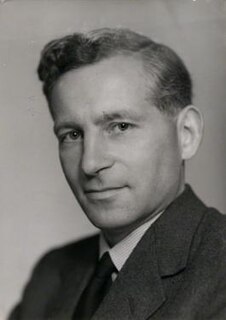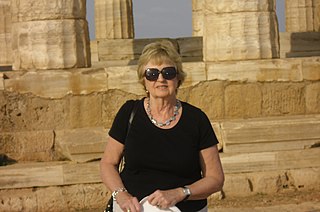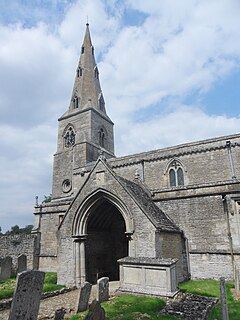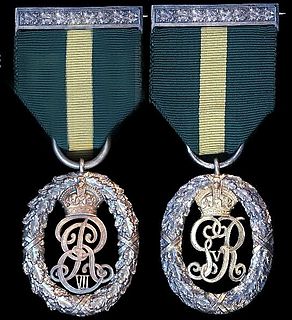Donatism was a schism in the Church of Carthage from the fourth to the sixth centuries AD. Donatists argued that Christian clergy must be faultless for their ministry to be effective and their prayers and sacraments to be valid. Donatism had its roots in the long-established Christian community of the Roman Africa province in the persecutions of Christians under Diocletian. Named after the Berber Christian bishop Donatus Magnus, Donatism flourished during the fourth and fifth centuries.

William Owen Chadwick was a British Anglican priest, academic, rugby international, writer and prominent historian of Christianity. As a leading academic, Chadwick became Dixie Professor of Ecclesiastical History from 1958 to 1968 and Regius Professor of History from 1968 to 1983. From 1956 to 1983, Chadwick was elected and served as the Master of Selwyn College, Cambridge.

Sir Diarmaid Ninian John MacCulloch is a British historian and academic, specialising in ecclesiastical history and the history of Christianity. Since 1995, he has been a fellow of St Cross College, Oxford; he was formerly the senior tutor. Since 1997, he has been Professor of the History of the Church at the University of Oxford.
Donatus Magnus, also known as Donatus of Casae Nigrae, became leader of a schismatic Christian sect known as the Donatists in North Africa. He is believed to have died in exile around 355.

John "Jack" McManners was a British clergyman and historian of religion who specialized in the history of the Church and other aspects of religious life in 18th-century France. He was Regius Professor of Ecclesiastical History at the University of Oxford from 1972 to 1984. He also served as Fellow and Chaplain of All Souls College, Oxford, from 1964 to 2001.
Wendy Elizabeth Davies is an Emeritus Professor of History at University College, London, England. Her research focuses on rural societies in early Medieval Europe, focusing on the regions of Wales, Brittany and Iberia.

Dame Averil Millicent Cameron, often cited as A. M. Cameron, is professor emerita of Late Antique and Byzantine History at the University of Oxford, and was formerly the Warden of Keble College, Oxford, between 1994 and 2010.
Antony Charles Thomas, was a British historian and archaeologist who was Professor of Cornish Studies at Exeter University, and the first Director of the Institute of Cornish Studies, from 1971 until his retirement in 1991. He was recognised as a Bard of the Cornish Gorseth with the name Gwas Godhyan in 1953.
Sarah Rosamund Irvine Foot is an English early medieval historian, academic, and Anglican priest. She is the current Regius Professor of Ecclesiastical History at the University of Oxford.
Harold McCarter Taylor, CBE TD was a New Zealand-born British mathematician, theoretical physicist and academic administrator, but is best known as a historian of architecture and the author, with his first wife Joan Taylor, née Sills, of the three volumes of Anglo-Saxon Architecture, published between 1965 and 1978.
Martin Biddle, is a British archaeologist and academic. He is an emeritus fellow of Hertford College, Oxford. His work was important in the development of medieval and post-medieval archaeology in Great Britain.
Maev Kennedy is a staff news writer for The Guardian and writes regularly for the Museums Journal. At The Guardian she has edited the diary column and also been the arts and heritage correspondent and also writes on archaeology.
Warwick James Rodwell is an archaeologist, architectural historian and academic. He is Visiting Professor in the Department of Archaeology, University of Reading, and Consultant Archaeologist to Westminster Abbey, where he is also a member of the College of St Peter in Westminster. He is the author of many books and articles, including the standard textbook on church archaeology. He is a Fellow of the Society of Antiquaries of London, the Society of Antiquaries of Scotland and the Royal Historical Society.
Richard John Bradley, is a British archaeologist and academic. He specialises in the study of European prehistory, and in particular Prehistoric Britain. From 1987 to 2013, he was Professor of Archaeology at the University of Reading; he is now Emeritus Professor. He is also the author of a number of books on the subject of archaeology and prehistory.
John Ferguson FRSE LL.D. was a Scottish chemist and bibliographer. He is noted for the early alchemy and chemistry bibliography Bibliotheca chemica. He was generally nicknamed Soda Ferguson. A collection of 7,500 books and manuscripts, held by Glasgow University originally from his library, are known as the Ferguson Collection.
Naomi Sykes FSA is a zooarchaeologist and is currently the Lawrence Professor of Archaeology at the University of Exeter. Sykes researches human-animal relations in the past.
Valerie Maxfield FSA is a Roman archaeologist and emeritus Professor of Archaeology at the University of Exeter. She is a specialist in the archaeology of the Roman army and frontiers.

The Ecclesiastical History Society (EHS) is a learned historical society founded in 1961 to foster interest in, and to advance the study of, all areas of the history of the Christian Church through twice yearly conferences and publications. Founders include Professor Clifford Dugmore of King's College, University of London, Dom David Knowles and William Frend. Since then the EHS has held annual conferences based on themes suggested by successive Presidents.
Jennifer Baird, is a British archaeologist and academic. She is Professor in Archaeology at Birkbeck, University of London. Her research focuses on the archaeology of Rome's eastern provinces.












